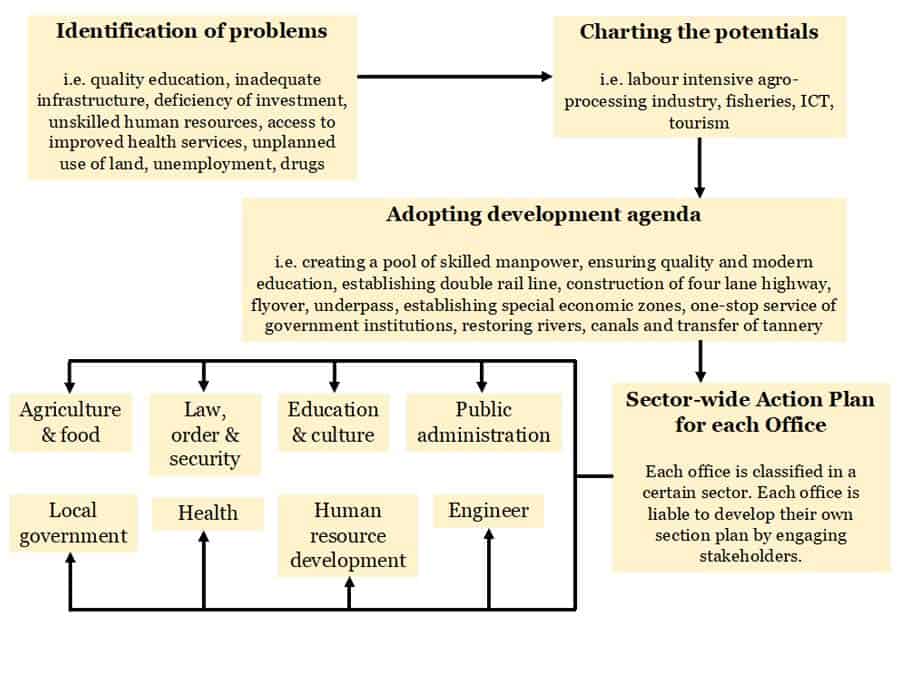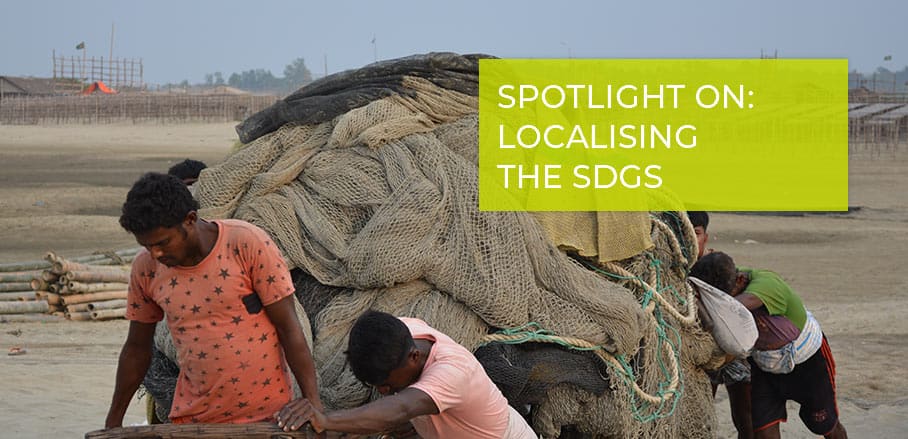The Challenge of Localising SDGs: Experiences from Bangladesh
Translating the Sustainable Development Goals (SDGs) into practice at the local level remains a significant challenge for many countries. Dr Firdaus Ara Hussain and Redita Rokib on the challenges in Bangladesh – and on a promising model pursued by the Government of Bangladesh to overcome them.
The Government of Bangladesh (GoB) has adopted the ‘Whole of Society’ approach to ensure ‘No One Left Behind’ as well as to materialise its commitment of successful SDG implementation. The country has taken significant steps towards setting the framework for institutionalising the SDGs at the national level including i) an action plan for implementing the SDGs; ii) an SDGs Tracker ; iii) an SDG Financing Strategy; iv) organising the 1st National Conference on SDG Implementation Review (July 4-6, 2018); v) forming a National Data Coordination Committee; vi) developing a framework of collaboration between the Government and the UN agencies in Bangladesh; and vii) approving 39+1 national priority indicators for localising the SDGs (GoB, 2020).
What are Challenges to SDG Localisation in Bangladesh?
Although localisation of SDGs has been at the core of the GoB’s national priorities, when it comes to spearheading the overall approach to achieve the Agenda 2030, there are still no clear institutional mechanisms for localising SDGs with the involvement of local government institutions (LGIs) in Bangladesh.
A dedicated budgetary allocation from the national level for SDG implementation at the local level is absent for the LGIs to draw upon. In one of the few existing studies, Khan et al. (2018) have identified and contextualised the SDG targets which are particularly relevant to and achievable by the local governments by taking the sub-district (Upazila) “Parishad” as a representative of Bangladeshi LGIs. Although the local government institutions in Bangladesh are often credited with introducing innovative practices – such as participatory budgeting and planning that lead to sustainable local development through embracing a shared vision for the future – there are a number of common problems with local governance.
These include a severe lack of LGIs’ capacities, inadequate coordination and overlapping of activities, lack of linkage in policy and practices, insufficient resource mobilisation, low degree of popular participation and lack of genuine political will and support for local governance reforms (Khan, Saha and Bhuiyan, 2018 ). For effective localisation of SDGs, addressing these chronic problems of local government, especially strengthening LGIs to design, implement, and monitor programmes in line with SDG targets, national plans, and local contexts are imperative. Furthermore, a clear gap in literature exist with regards to SDG localisation and LGIs, indicating limited academic research on SDGs in Bangladesh particularly at the local level. Finally, funds from the national level are focused on infrastructure development especially in the urban areas such as the mega city of Dhaka.
The Natore Model – A Role Model for other District Administrations of Bangladesh
Despite the challenges, one example on spearheading SDG localisation has been identified, notably, the Natore Model. Natore is located in the northern part of the country. As of the 2011 census, 1,706,673 people live in Natore, with an annual population growth rate of 1.4 per cent. Natore district has seven Upazilas and eight municipalities.
The local government administration of Natore District has developed a SDG District Action Plan (Figure 1), commonly known as the Natore Model, to achieve the convergence of all government offices and stakeholders based on the 2030 Agenda. This model implements SDG at district level to address local problems, potentials, and action programmes for all government agencies. As it has the potential of being replicated in other government administration, it has now been defined as a model by GoB.
This framework, however, is still in its early stages. This approach will be important to concentrate adequately on identifying and developing innovative solutions for SDG target-oriented problems. In addition, the existing structural bottlenecks in Bangladesh’s local government system were not considered in this model. Moreover, the important role played in the implementation process by local government officials, Civil Society Organizations (CSOs), NGOs and other stakeholders was not clearly defined. It therefore remains a major challenge to ensure its proper implementation in an inclusive way.

The Natore Model © Centre for Policy Dialogue
The Deutsche Gesellschaft für Internationale Zusammenarbeit (GIZ) GmbH through the “Improved Coordination of International Climate Finance Project”, has conducted a study to explore the introduction of SDGs localisation tools as well as partnership opportunities among the National Institute of Local Governance (NILG) and the Governance Innovation Unit (GIU) under Prime Minister’s Office (PMO) of Bangladesh for SDG implementation. Of particular interest to GIZ have been SDG localisation tools specific to city corporation and municipalities.
This project is outlining the major steps towards introducing suitable SDG localisation tools at selected LGIs. The next steps include activities for engagement (in a partnership mode of action among GIZ, NILG, and GIU) and an Action Plan for implementation of the proposed activities, capacity development measures for LGIs on SDG localisation, introduction of suitable tools, and multi-stakeholder engagement. The interventions by GIZ are in progress and are expected to be completed by 2022.
